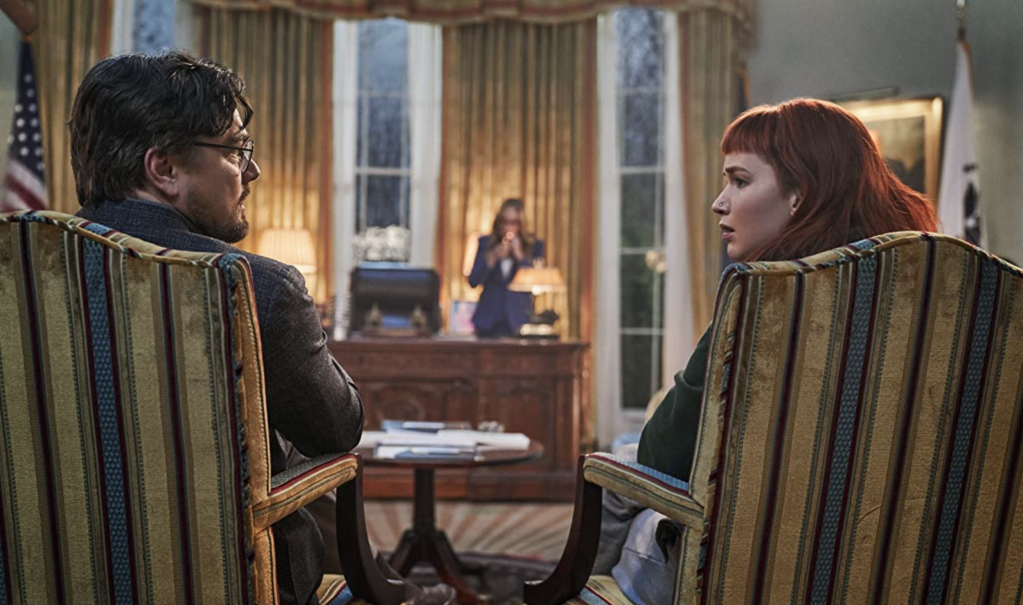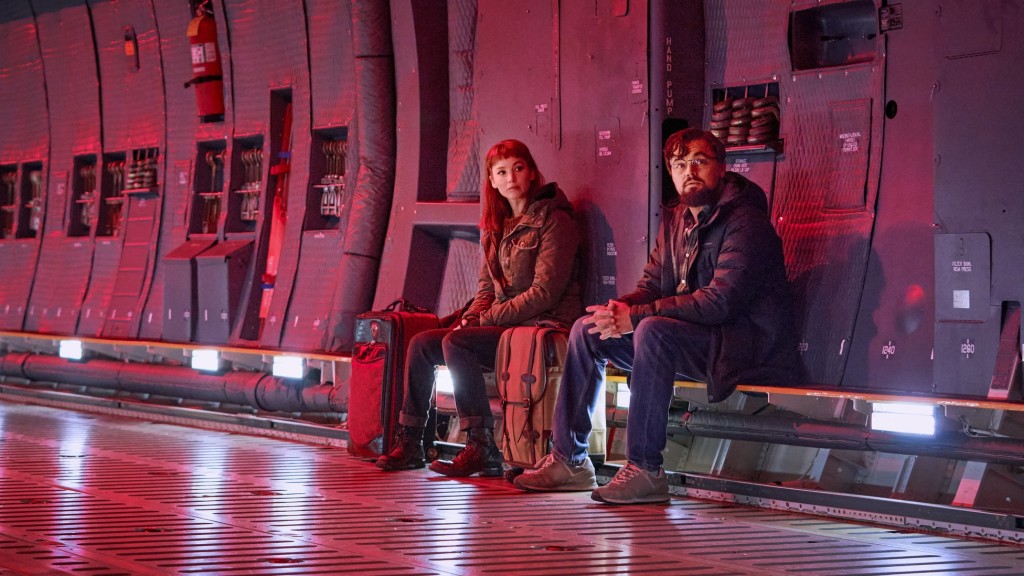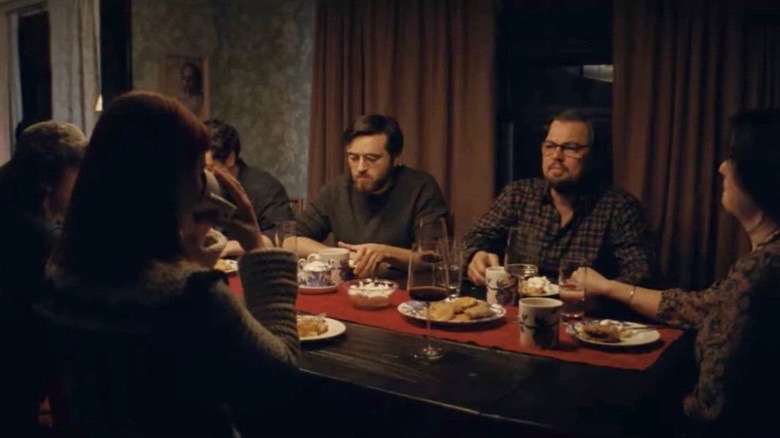
Human narcissism and all that it has wrought, including the destruction of nature, will finally be our downfall. In the end, McKay isn’t doing much more in this movie than yelling at us, but then, we do deserve it.
— Manohla Dargis, “Tick, Tick, Kablooey!”[i]
God is our refuge and our strength,
a very present help in trouble.
Therefore we will not fear,
though the earth be moved,
and though the mountains be toppled
Into the depths of the sea.
— Psalm 46:1-2
Spoiler alert: If you want to see Don’t Look Up with innocent eyes, watch the movie before reading this. It is currently streaming on Netflix.
Kierkegaard once told a parable about the human capacity for denial. A fire broke out backstage in a crowded theater before the performance. With the curtains still drawn, the audience was unaware of the danger, so one of the actors stepped out to warn them. But he was dressed as a clown, and the people thought his cries of alarm must be some kind of joke. The louder he shouted “YOU’RE ALL GOING TO DIE!”, the more they laughed and cheered. By the time they realized the peril for themselves, it was too late.
“I think,” said the Danish philosopher, “that’s just how the world will end—to general applause.” [ii]
One of the most popular current films, Don’t Look Up, is a farce about the extinction of life on our planet. It dresses its message of disaster and death in a comic premise: most of humanity is either too witless, deluded, or self-absorbed to acknowledge the threat. The more ridiculously the characters behave, the more we laugh—at least until the (literally) bitter end.
Like Kierkegaard’s clown, director and co-writer Adam McKay has serious intentions. “I’ve been really terrified about the climate, the collapse of the livable atmosphere,” he told an interviewer. “It seems to be getting faster and faster. Yet for some reason, it’s not penetrating our culture.”[iii] Since climate change is a gradual process stretching far beyond our attention span, McKay has substituted a more instantaneous disaster for our consideration. In the movie, an immense comet is headed straight for planet Earth. In six months, all living things will be destroyed.
An astronomy professor at Michigan State, Dr. Randall Mindy (Leonardo DiCaprio), and his protégé, Kate Dibiasky (Jennifer Lawrence), discover the comet and try to warn the White House and the world. But their pleas for action go largely unheeded, and things go merrily downhill from there. As Manohla Dargis writes, Don’t Look Up is “a very angry, deeply anguished comedy freakout about how we are blowing it, hurtling toward oblivion. He’s sweetened the bummer setup with plenty of yuks — good, bad, indifferent — but if you weep, it may not be from laughing.” [iv]

During preproduction, the world was struck by a different disaster—the pandemic. The mismanaged Trumpian response, followed by the deadly denialism of the anti-vaxxers, added fuel to the satirical fire. McKay’s parable became as much about COVID as it is about climate change. It was hard to keep the fictional script ahead of the times. McKay said they had to make the film “20% crazier, because reality had played out crazier than the script.” [v]
In most disaster movies, human ingenuity and determination win out in the end, and the world manages to survive. But Don’t Look Up is not so forgiving. Human folly and sin guarantee global extinction. And no matter how much we have been entertained by the stellar cast and amusing scenarios, we are meant to come away unsettled. Complacency is not an option. The theater of Nature is on fire. This is not a drill.
The film has been embraced by the viewing public as well as activists, but many critics have been not only dismissive but contemptuous: “… it’s one joke, told over and over and over again”[vi] … “the attempts at mockery are broad, puerile, and obvious, unintentionally trivializing the issues it seeks to highlight”[vii] … “drowns in its own smugness”[viii] … “its simplistic anger-stoking and pathos-wringing mask the movie’s fundamental position of getting itself talked about while utterly eliding any real sense of politics or political confrontation.”[ix]
David Fear of Rolling Stone is particularly brutal: “… a righteous two-hour lecture masquerading as a satire .… So caught up in its own hysterical shrieking that it drowns out any laughs, or sense of poignancy, or points it might be trying to make … it’s never able to find a way to crawl out of the tarpit of its own bone-deep despair … it doesn’t mean that one man’s wake-up-sheeple howl into the abyss is funny, or insightful, or even watchable. It’s a disaster movie in more ways than one. Should you indeed look up, you may be surprised to find one A-list bomb of a movie, all inchoate rage and flailing limbs, falling right on top of you.”[x]
There have been more measured critiques. Some find Don’t Look Up heavy-handed and misanthropic. Most of the characters, they say, are too cartoonishly stupid or corrupt to make us care deeply about their fate. Some think the filmmaker is too cynical about our collective capacity to counteract moral blindness and systemic evil, leaving us discouraged rather than empowered. Others, weighing the effectiveness of the relentlessly over-the-top caricatures, ponder “the question of whether our culture has become too depressing, too absurd, too lamentable to satirize.” [xi]
In a lengthy and sober analysis, Eric Levitz judges the comet scenario to be a misleading metaphor for climate change:
“In the film’s populist, polemical account of the ecological crisis, there is … no need for Americans to tolerate significant disruptions to their existing way of life, no vexing question of global redistribution, no compelling benefits from ongoing carbon-intensive growth, and thus no rational or uncorrupted opponent of timely climate action. Don’t Look Up casts the conflict between minimizing climate risk and maximizing near-term economic growth as one pitting the interests of billionaires against those of everyone else.” [xii]
What I find missing in all this criticism is a sense of genre. The lack of political nuance, psychological depth, or aesthetic rigor is beside the point. This film embraces the method of the Italian Commedia dell’Arte, where stock characters “make sport of human foibles and universal complaints while burlesquing the most socially or politically prominent members of a given community.” [xiii]
In the early 20th century, the Commedia model was adapted by Russian “agitprop” theater, “noted for its cardboard characters of perfect virtue and complete evil, and its coarse ridicule.”[xiv] Agitprop’s aim was not to create great art, but to inspire collective action. In the American 1960s, groups like the San Francisco Mime Troupe practiced a similar “guerilla theater,” whose purpose, as stated in a 1967 manifesto by R. G. Davis, was to criticize “prevailing conditions … expressing what you (as a community) all know but no one is saying … truth that may be shocking and honesty that is vulgar to the aesthete … There is a vision in this theater, and … it is to continue … presenting moral plays and to confront hypocrisy in the society.” [xv]
It’s a playful form of politics, using laughter to dethrone the powers of this world by undermining their pretensions to ultimacy. As the Psalmist says, “God is laughing at them; the Lord has them in derision” (Psalm 2:4). Prophetic mockery is the genesis of revolution. It’s liberating and cathartic. But if it remains merely a way to blow off steam, or a refreshing but temporary lightening of spirit, that is not enough. Action must follow. We must become the change we seek.

Millions of people have seen Don’t Look Up. Its content and aims are being widely and passionately discussed. Is it a good movie? How accurate is its central metaphor? Which actors stand out? Is it funny? Given the film’s vast global reach and the urgency of the crisis, these become secondary questions. What I want to know is: Does it make a difference? Can it provoke repentance? Will it produce change?
Every preacher and every liturgist wonders the same things. How do our sermons, images, rituals and stories contribute to the transformational mix? In a podcast conversation about the film, Atlantic writer Spencer Kornhaber addresses this issue:
“I think this quest for movies to deliver a message that changes people’s minds is maybe quixotic. There aren’t a ton of works in history like that. But what they do do is give you a set of images and characters and metaphors and clichés that, when they work, become absorbed into our language. They help us talk about the world in ways that are hopefully progressing our discourse and society.” [xvi]
Of course, a film about global annihilation is a hard sell (and released at Christmas, no less!). The prospect of unimaginable loss opens the door to nihilism and despair. Why bother? Why go on? The director himself describes his film as a place where “absurdist, ridiculous comedy lives right next to sadness … so the trickiest part of the movie was to ramp down that tone in the last 20 minutes.” During a script conference before shooting started, one of the producers asked McKay, “Where’s faith in this movie?” And the director, whose mother was a born-again evangelical, exclaimed, “Oh, you’re right. You’re right!” [xvii]

As the comet nears its collision with earth, we see people facing extinction in various ways. Some are praying, some are partying, some are weeping, some are just staring at the sky in disbelief, fear, or hopeless resignation. But in a dining room in East Lansing, Michigan, a small group of friends and family have gathered around a table for a communal last supper. Among them are Randall and Kate. For six months they had tried and failed to awaken humanity to effective action. Now they are back home, choosing neither anger nor despair for their final moments on earth, but gratitude and communion.
As the food is shared, each of them names something they are grateful for. Then Randall says, “Well, we’re not the most religious here in the Mindy household, but, um, maybe we should say ‘amen?’ Should we do that?”
Most of them are unpracticed in prayer, so this suggestion creates an awkward pause. But Yule, a young Christian skateboarder (Timothée Chalamet), speaks up. “I’ve got this,” he says. Everyone joins hands around the table, and Yule begins to pray:
“Dearest Father, Almighty Creator, we ask for your grace tonight, despite our pride; your forgiveness, despite our doubt. Most of all, Lord, we ask for your love, to soothe us through these dark times. May we face whatever is to come in your divine will with courage and open hearts of acceptance. Amen.”
Somewhere across the globe, the comet strikes, and an immense tsunami begins to swallow planetary life like the biblical flood. Yes, there is a parodic ark, reserved for the billionaires, bearing them to a justly ironic fate in a galaxy far, far away. But the true ark of the righteous remnant is that Michigan dining room.
In their final minute on earth, the men and women around the table discuss small, ordinary blessings like the store-bought apple pie and the delicious home-brewed coffee. In an inspired ad-lib that had occurred to DiCaprio between takes, Dr. Mindy speaks his last words:
“Thing of it is, we really did have everything, didn’t we?
I mean, when you think about it.”
The simple human beauty of this last supper, more than the script’s many earnest pleadings, makes the film’s best case for preserving the world. It seems no accident that the one who sets the spiritual tone is named Yule, an old word for Christmas. Even at history’s last moment, Love is being made flesh.
Then, as the walls around them begin to disintegrate, the screen goes suddenly dark. The circle of human love has vanished into the Divine Mystery.
After watching Don’t Look Up, I came across a poem by John Hollander which articulates for me the feeling of this moving finale. “At the New Year” is about the new beginnings that emerge from all the endings—those moments when we feel “every door in the world shutting at once.” Then the poet prays, “let it come at a time like this, not at winter’s / Night,” but “at a golden / Moment just on the edge of harvesting, ‘Yes. Now.’ / … as we go / Quietly on with what we shall be doing, and sing / Thanks for being enabled, again, to begin this instant.” [xviii]
So the apocalypse ends not with a bang, but with a softly spoken thanks for everything. Even when the worst arrives, the answering word is Yes, and the circle of love goes “quietly on with what we shall be doing,” and singing our thanks. Every moment, even the last one, is a gift to be savored. May our own precious moments on this earth be hallowed with gratitude, acceptance, and trust, now and at the hour of our death.
[i] Manohla Dargis, New York Times review of Don’t Look Up (12/23/21): https://www.nytimes.com/2021/12/23/movies/dont-look-up-review.html
[ii] Søren Kierkegaard, Either/Or, Part 1 (1843).
[iii] Adam McKay, quoted in Frederic and Mary Brussat, film review of Don’t Look Up in Spirituality and Practice (Dec. 21, 2021): https://www.spiritualityandpractice.com/films/reviews/view/29113/dont-look-up
[iv] Dargis, “Tick, Tick, Kablooey!” New York Times review (12/23/21).
[v] McKay, q. in David Sims, “Don’t Look Up is a Primal Scream of a Film,” The Atlantic (12/23/21): https://www.theatlantic.com/culture/archive/2021/12/dont-look-up-adam-mckay-netflix-movie/621104/
[vi] Max Weiss, Baltimore Magazine (12/27/21): https://www.baltimoremagazine.com/section/artsentertainment/movie-review-dont-look-up/
[vii] James Berardinelli, Reel Reviews (12/23/21): https://www.reelviews.net/reelviews/don-t-look-up
[viii] Sameen Amer, The News International, Pakistan (1/16/22): https://www.thenews.com.pk/tns/detail/925421-in-the-picture
[ix] Richard Brody, “The Crude Demagogy of Don’t Look Up,” The New Yorker (1/6/22): https://www.newyorker.com/culture/the-front-row/the-crude-demagogy-of-dont-look-up
[x] David Fear, “‘Don’t Look Up…or You Might See One Bomb of a Movie Hurtling Right Toward You,” Rolling Stone (12/24/21): https://www.rollingstone.com/movies/movie-reviews/dont-look-up-review-leonardo-dicaprio-jennifer-lawrence-1268779/
[xi] “Why Are People So Mad About Don’t Look Up?,” The Atlantic podcast (1/14/22): https://www.theatlantic.com/podcasts/archive/2022/01/dont-look-up-satire/621256/
[xii] Eric Levitz, “Don’t Look Up Doesn’t Get the Climate Crisis,” New York Magazine (1/5/22):https://nymag.com/intelligencer/2022/01/dont-look-up-climate-metaphor-review.html
[xiii] Michael William Doyle, “Staging the Revolution: Guerilla Theater as a Countercultural Practice, 1965-1968”: https://www.diggers.org/guerrilla_theater.htm
[xiv] Richard Pipes, Russia Under the Bolshevik Regime, 303, cited in “Agitprop” (Wikipedia).
[xv] Doyle, “Staging the Revolution …”
[xvi] Spencer Kornhaber, “”Why Are People So Mad …?”
[xvii] Adam McKay, interview in Variety, “Adam McKay on the Ending(s) of Don’t Look Up” (Dec. 2021): https://variety.com/2021/film/news/adam-mckay-dont-look-up-ending-spoilers-1235142363/
[xviii] John Hollander (1929-2013), “At the New Year,” in American Religious Poems: An Anthology by Harold Bloom, eds. Harold Bloom & Jesse Zuba (New York: Library of America, 2006), 442-443.
